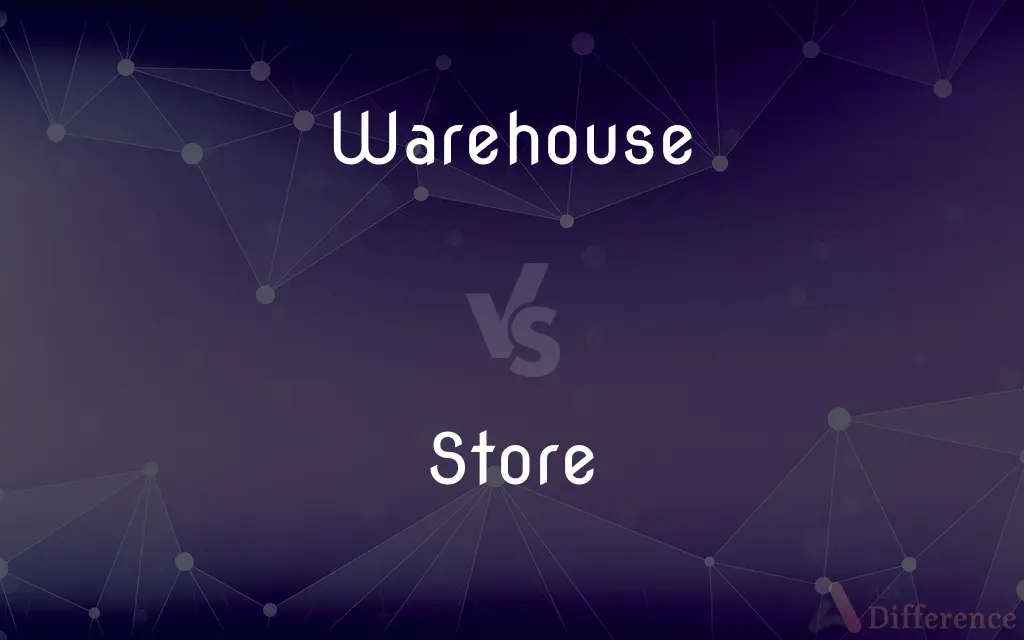Warehouse vs. Store — What's the Difference?
Edited by Tayyaba Rehman — By Fiza Rafique — Updated on October 25, 2023
A Warehouse is a large facility for storing goods; a Store is a retail establishment selling goods to the public.

Difference Between Warehouse and Store
Table of Contents
ADVERTISEMENT
Key Differences
A Warehouse typically refers to a sizable building where goods are stored, often before they are distributed to various locations. On the other hand, a Store is where consumers directly purchase items for personal use.
While Warehouses focus on the bulk storage of products, often in industrial areas, Stores are often located in commercial zones to attract customers. One might visit a Warehouse for wholesale purchases or to obtain stock for a business, while a Store is frequently visited by everyday consumers looking to make individual purchases.
In essence, a Warehouse functions as a holding or distribution center for goods, whereas a Store serves as a direct point of sale to end-users.
Comparison Chart
Primary Purpose
Storage of goods
Selling goods to consumers
Location
Often in industrial areas
Located in commercial zones or malls
ADVERTISEMENT
Volume
Bulk storage
Retail quantities
Accessibility
Limited public access
Open to the public
Interaction
B2B (Business to Business) focused
B2C (Business to Consumer) focused
Compare with Definitions
Warehouse
Warehouses typically are not open to the general public.
The Warehouse had restricted access to authorized personnel only.
Store
A Store is a place where goods are sold to the public.
She visited the Store to buy a new dress.
Warehouse
A Warehouse is a large building for storing goods.
The company built a new Warehouse to accommodate its expanding inventory.
Store
A place where merchandise is offered for sale; a shop.
Warehouse
A Warehouse might contain specialized storage systems.
The new Warehouse was equipped with automated shelving systems.
Store
A stock or supply reserved for future use
A squirrel's store of acorns.
Warehouse
A place for storing large amounts of products. In logistics, a place where products go to from the manufacturer before going to the retailer.
Store
Stores Supplies, especially of food, clothing, or arms.
Warehouse
A Warehouse can be a hub for logistical operations.
The Warehouse managed both incoming shipments and outgoing deliveries.
Store
A place where commodities are kept; a warehouse or storehouse.
Warehouse
A warehouse is a building for storing goods. Warehouses are used by manufacturers, importers, exporters, wholesalers, transport businesses, customs, etc.
Store
A great quantity or number; an abundance.
Warehouse
A large building where raw materials or manufactured goods may be stored prior to their distribution for sale.
Store
To reserve or put away for future use.
Warehouse
Store (goods) in a warehouse
The pallets were warehoused the following day
Store
To fill, supply, or stock.
Warehouse
Place (a prisoner or a psychiatric patient) in a large, impersonal institution in which their problems are not satisfactorily addressed
Our objective is not to warehouse prisoners but to help inmates build new lives
Store
To deposit or receive in a storehouse or warehouse for safekeeping.
Warehouse
A place in which goods or merchandise are stored; a storehouse.
Store
(Computers) To copy (data) into memory or onto a storage device, such as a hard disk.
Warehouse
A large, usually wholesale shop.
Store
A place where items may be accumulated or routinely kept.
This building used to be a store for old tires.
Warehouse
To place or store in a warehouse, especially in a bonded or government warehouse.
Store
A supply held in storage.
Warehouse
To institutionalize (a person) in usually deficient housing and in conditions in which medical, educational, psychiatric, and social services are below par or absent
"has felt forced to warehouse hundreds of children in temporary shelters" (Justine Wise Polier).
Store
(mainly North American) A place where items may be purchased; a shop.
I need to get some milk from the grocery store.
Warehouse
(transitive) To store in a warehouse or similar.
Store
Memory.
The main store of 1000 36-bit words seemed large at the time.
Warehouse
(transitive) To confine (a person) to an institution for a long period.
Store
A great quantity or number; abundance.
Warehouse
To acquire and then shelve, simply to prevent competitors from acquiring it.
The warehousing of syndicated TV shows
Store
A head of store cattle (feeder cattle to be sold to others for finishing); a store cattle beast.
Warehouse
A storehouse for wares, or goods.
Store
(transitive) To keep (something) while not in use, generally in a place meant for that purpose.
I'll store these books in the attic.
Warehouse
To deposit or secure in a warehouse.
Store
Contain.
The cabinets store all the food the mice would like.
Warehouse
To place in the warehouse of the government or customhouse stores, to be kept until duties are paid.
Store
Have the capacity and capability to contain.
They sell boxes that store 24 mason jars.
Warehouse
A storehouse for goods and merchandise
Store
To write (something) into memory or registers.
This operation stores the result on the stack.
Warehouse
Store in a warehouse
Store
That which is accumulated, or massed together; a source from which supplies may be drawn; hence, an abundance; a great quantity, or a great number.
The ships are fraught with store of victuals.
With store of ladies, whose bright eyesRain influence, and give the prize.
Warehouse
Warehouses are often used for wholesale or distribution purposes.
Goods from the Warehouse were shipped to various retail outlets.
Store
A place of deposit for goods, esp. for large quantities; a storehouse; a warehouse; a magazine.
Store
Any place where goods are sold, whether by wholesale or retail; a shop.
Store
Articles, especially of food, accumulated for some specific object; supplies, as of provisions, arms, ammunition, and the like; as, the stores of an army, of a ship, of a family.
His swine, his horse, his stoor, and his poultry.
In his needy shop a tortoise hung,An alligator stuffed, and other skinsOf ill-shaped fishes; and about his shelvesA beggarly account of empty boxes.
Sulphurous and nitrous foam, . . . Concocted and adjusted, they reducedTo blackest grain, and into store conveyed.
Store
Accumulated; hoarded.
Store
To collect as a reserved supply; to accumulate; to lay away.
Dora stored what little she could save.
Store
To furnish; to supply; to replenish; esp., to stock or furnish against a future time.
Her mind with thousand virtues stored.
Wise Plato said the world with men was stored.
Having stored a pond of four acres with carps, tench, and other fish.
Store
To deposit in a store, warehouse, or other building, for preservation; to warehouse; as, to store goods.
Store
A mercantile establishment for the retail sale of goods or services;
He bought it at a shop on Cape Cod
Store
A supply of something available for future use;
He brought back a large store of Cuban cigars
Store
An electronic memory device;
A memory and the CPU form the central part of a computer to which peripherals are attached
Store
A depository for goods;
Storehouses were built close to the docks
Store
Keep or lay aside for future use;
Store grain for the winter
The bear stores fat for the period of hibernation when he doesn't eat
Store
Find a place for and put away for storage;
Where should we stow the vegetables?
I couldn't store all the books in the attic so I sold some
Store
Stores can range from small boutiques to large chains.
The downtown area had an eclectic mix of Stores.
Store
A Store often has displays to attract and inform customers.
The Store window had a beautiful holiday display.
Store
Stores are typically located in commercial areas or malls.
The new mall had a variety of Stores to choose from.
Store
A Store offers a direct purchasing experience for consumers.
He went to the Store to try on shoes before buying them.
Common Curiosities
Do Warehouses sell directly to consumers?
Typically, Warehouses serve businesses, but some, like warehouse clubs, do sell to consumers.
Can you shop at a Warehouse?
Some Warehouses are open to the public, like wholesale clubs, but many are not.
What is the main function of a Warehouse?
A Warehouse primarily functions to store goods, often in bulk.
Is a mall considered a Store?
A mall is a collection of individual Stores; it's not a Store in itself.
Can a Warehouse also be a Store?
Yes, some establishments, like warehouse clubs, function as both a Warehouse and a Store.
What's a warehouse club?
A warehouse club is a retail Store that sells items in bulk, often in a Warehouse setting.
Is a grocery Store different from other Stores?
While a grocery Store sells food items primarily, the concept is the same: selling goods to consumers.
How does a Store differ from a Warehouse?
A Store sells goods directly to consumers, while a Warehouse is more for storage and distribution.
Can consumers visit a Warehouse?
Some Warehouses, especially wholesale clubs, are open to consumers, but many restrict access.
Why are Stores located in commercial zones?
Stores are in commercial areas to attract and be accessible to consumers.
How do Stores get their products?
Stores often receive products from Warehouses or direct suppliers.
Do online Stores have Warehouses?
Yes, many online Stores utilize Warehouses to store and distribute their products.
Are all Stores brick-and-mortar establishments?
No, online retailers are also Stores, but they operate digitally.
Do Warehouses have inventory systems?
Yes, most Warehouses use inventory systems to track and manage stored goods.
Why might a business need a Warehouse?
Businesses use Warehouses to store products, manage inventory, and streamline distribution.
Share Your Discovery

Previous Comparison
Bicyclist vs. Cyclist
Next Comparison
Doe vs. DeerAuthor Spotlight
Written by
Fiza RafiqueFiza Rafique is a skilled content writer at AskDifference.com, where she meticulously refines and enhances written pieces. Drawing from her vast editorial expertise, Fiza ensures clarity, accuracy, and precision in every article. Passionate about language, she continually seeks to elevate the quality of content for readers worldwide.
Edited by
Tayyaba RehmanTayyaba Rehman is a distinguished writer, currently serving as a primary contributor to askdifference.com. As a researcher in semantics and etymology, Tayyaba's passion for the complexity of languages and their distinctions has found a perfect home on the platform. Tayyaba delves into the intricacies of language, distinguishing between commonly confused words and phrases, thereby providing clarity for readers worldwide.
















































